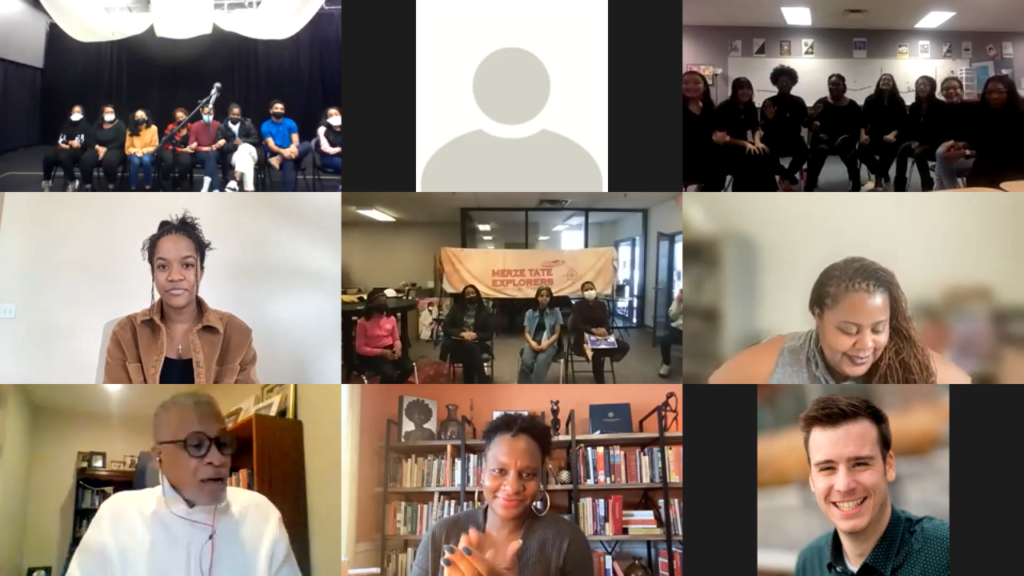A group of Michigan State University faculty and students from the Department of Theatre in collaboration with the Wharton Center Institute for Arts & Creativity led an effort to bring the Next Narrative Monologue Competition (NNMC) to Michigan, a national high school competition that celebrates the diverse perspectives and worldviews of the Black community by bringing works of contemporary Black playwrights to life through monologues created especially for students in grades 9 through 12.
This regional competition for Lansing and Detroit area schools was held over Zoom on March 12 and organized by faculty, staff, and students from the Department of Theatre and the Wharton Center. The top two winners from the competition — Aija Hodges and Ife Martin — won all-expense-paid trips to New York City where they will compete in the National Finals on the Apollo Theatre Stage.
“Having other Black mentors, Black coaches, and Black judges is extremely important for younger Black students to see that there are other people who are actively perusing the same things they may wish to.”
Jewell Redman, BFA Acting major
“Having other Black mentors, Black coaches, and Black judges is extremely important for younger Black students to see that there are other people who are actively perusing the same things they may wish to,” said Jewell Redman, a sophomore BFA Acting major at MSU who helped with the competition. “Personally, seeing Black women as a guide in television and theatre outlets was important for me to know that I have an opportunity to do the same. So, assisting and teaching these students was very meaningful and personal to me.”
While giving high school students the opportunity to grow their acting, storytelling, and public speaking skills, the competition exposed students to the literary works of several contemporary Black playwrights from around the world.

“These works instill confidence and help students find their voices through artful exploration,” said Mona Eldahshoury, MFA Acting Candidate who worked closely with the collaboration between MSU and NNMC. “This is important because Black storytelling is needed now more than ever. Through Black storytelling, we discover, find new truths and new voices. This is in direct line with MSU’s DEI (Diversity, Equity, and Inclusion) efforts to create a culture that embraces these terms.”
Despite the progress that has been made to offer theatre by artists of color, there is still a lack of relevant material for young people of color and this program provides that, says Bert Goldstein, Director of Wharton Center Institute for Arts & Creativity, who helped bring the competition to Michigan.
“This is important because Black storytelling is needed now more than ever. Through Black storytelling, we discover, find new truths and new voices.”
Mona Eldahshoury, MFA Acting Candidate
“The overall objective was to give high school students of color a chance to explore theatre of color by contemporary playwrights,” Goldstein said. “They did this by rehearsing and performing a theatrical monologue by a contemporary playwright of color and the students were coached by theatre professionals who have experience working with young people.”
The competition not only gave students of color the chance to explore the work of Black playwrights, but also to explore theatre written to their age range that speaks to the many issues, concerns, and joys they have living as young people during this time in history.

“I sadly didn’t have any programs like this while I was in high school…I hope the students see that their stories are important and that they can be storytellers. I hope the industry and MSU theatre will see that BIPOC students can tell many stories – both stories that are heavy and light,” said QueenMakeeda Taylor, a sophomore BFA Acting major who helped with the competition. “In this industry, we have to support one another. I was so happy to see the joy in the students’ faces when their peers won.”
The faculty, students, and staff who facilitated the competition in Michigan mentored the high school students, organized administrative functions, and propelled the program forward.
The MSU Department of Theatre faculty members who were involved in organizing the regional competition include: Rob Roznowski, Professor of Acting; Elizabeth Gray, Assistant Professor of Musical Theatre; Deric McNish, Associate Professor of Acting, Voice, and Speech; Philip Effiong, Associate Professor of Theatre Studies; and Sarah Hendrickson, Academic Specialist in Improv and Acting and Teaching Artist for the Wharton Center Institute for Arts & Creativity. And, besides Eldahshoury, Redman, and Taylor, MFA Acting Candidate Ural Grant also helped with the competition. Also from the Wharton Center Institute for Arts & Creativity, working on this project, besides Goldstein, was Ben English. All of these faculty, staff, and students have dedicated their time and energy to lend their expertise to organize this event and to mentor the high school students throughout the competition.
“The Next Narrative Monologue Competition aligns with MSU’s and the Department of Theatre’s Diversity, Equity, and Inclusion efforts by reaching global majority students and introducing them to some of today’s best playwrights writing on themes that impact them.”
Rob Roznowski, Professor of Acting
As a result of the tireless efforts of the competition organizers, high school students from Michigan had the opportunity to build upon their interpersonal relationships and acting skills, expand their knowledge, and gain new expertise while becoming familiar with the best and brightest contemporary Black writers.
Opportunities like this work to anchor Michigan State University in the commitment, help to increase diversity and promote a culture of dignity, respect, empathy, and accountability in the performing arts.
“The Next Narrative Monologue Competition aligns with MSU’s and the Department of Theatre’s Diversity, Equity, and Inclusion efforts by reaching global majority students and introducing them to some of today’s best playwrights writing on themes that impact them,” Roznowski said. “The program is expensive to run, and we are seeking ways to make it sustainable because it is an important endeavor.”
Written by Hannah Diggs


